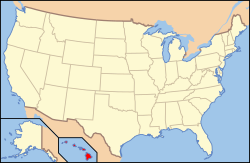| Hawaii Department of Public Safety | |
|---|---|
 Patch of the Correction Division | |
 Patch of the Law Enforcement Division | |
| Abbreviation | DPS |
| Agency overview | |
| Dissolved | December 31, 2023 |
| Employees | 2,263 (as of 2006) |
| Jurisdictional structure | |
| Operations jurisdiction | Hawaii, U.S. |
 | |
| Map of Hawaii Department of Public Safety's jurisdiction | |
| Size | 10,931 square miles (28,310 km2) |
| Population | 1,283,388 (2007 est.) [1] |
| General nature | |
| Operational structure | |
| Headquarters | Honolulu, Hawaii |
| Deputy Sheriffs Narcotics Enforcement Agents | 300 (authorised, as of 2022) [2] |
| Facilities | |
| Prisons | 4 |
| Jails | 4 |
| Website | |
| https://dps.hawaii.gov/ | |
The Hawaii Department of Public Safety was a department within the executive branch of the government of the U.S. state of Hawaii. It was headquartered in the 919 Ala Moana Boulevard building in Honolulu, Hawaii. [3] At the time of its deactivation, the Department of Public Safety was made up of three divisions: Administration, Corrections, and Law Enforcement.
Contents
- Divisions
- Administration Division
- Corrections Division
- Law Enforcement Division
- Fallen officers
- Controversies
- See also
- References
- External links
Pursuant to the Hawaii Bill HB 2171, the Department of Public Safety was deactivated on December 31, 2023 and its personnel, duties, and functions were transferred to two new separate departments: the Hawaii Department of Corrections and Rehabilitation and the Hawaii Department of Law Enforcement. Per the bill, the Hawaii State Legislature found that the goals and functions of corrections and law enforcement are different and distinct and separating the functions of corrections and law enforcement from the department of public safety into two separate departments would best accomplish the discrete goals and objectives of both functions. [4]
